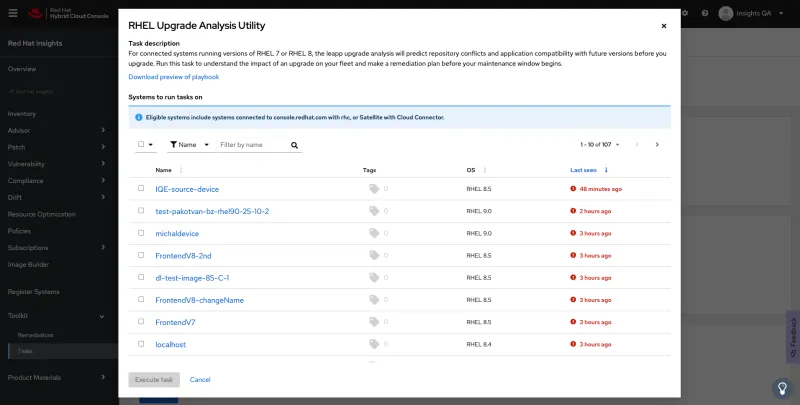Large scale, major release updates can be daunting. Red Hat can help.
This article explores using Red Hat Insights to run a pre-upgrade analysis on all (or a group of) systems running Red Hat Enterprise Linux (RHEL) in your fleet. Results are displayed in a simple, consolidated view, giving you management-ready reporting on your organization’s OS upgrade readiness.
Mission critical or fragile systems can be cumbersome to upgrade, especially when OS upgrades are long overdue or involve hosts with key users or applications. The key to a successful OS upgrade is planning and, ultimately, assessing the current situation. Customers can now run the RHEL pre-upgrade analysis utility to check for missing packages, misconfigurations and other well-known potential mishaps that can occur during an OS upgrade. Connect your system to Red Hat Insights to get started.
How it works
Red Hat Insights enables users to take a more proactive approach to system management, including access to vulnerability detection, drift alerting, compliance adherence, optimization recommendations and more. When connected, hosts will send a small amount of data to Insights, allowing Red Hat to detect any risks to your system. This data averages about 400 kB of transfer, which is about 1% of the information sent during an SOS report generated by Red Hat Support.
Once connected to Insights, you also gain access to a suite of one-off “tasks,” or investigations, that Red Hat makes available to maintain the health of your environment. One of those tasks, RHEL’s pre-upgrade analysis utility, scans hosts for repository conflicts and application compatibilities, and includes a detailed priority list on how to prepare systems for an in-place upgrade.
Users can select which systems are ideal for a pre-upgrade analysis, with filtering options based on OS version or tags.

Customers have the ability to preview (and download) the playbook to understand the exact process before executing on the selected hosts. Once the task begins to run, it will create a series of “jobs” which will track the progress of running the playbook on each host. As hosts complete their jobs, each will report back on their upgradability, identifying blocking issues (“inhibitors”), non blocking issues (“problems”), and if appropriate, full readiness.

Once all jobs on the hosts are complete, the task will be marked complete. Customers can then view their aggregate results, dig into specific systems and even export the results and details.
After reviews and any required remediations are complete, users can proceed with the rest of the upgrade processes as defined in Supported in-place upgrade paths for Red Hat Enterprise Linux.
System requirements
Red Hat Insights can run RHEL’s pre-upgrade analysis task on any systems connected via Remote Host Configurator (available in RHEL 8.5 or greater) or any systems connected via a Satellite. Customers who don't fit these criteria can perform the pre-upgrade analysis directly on a host by following the instructions at Chapter 4. Reviewing the pre-upgrade report.
Easily configure your host via remote host configuration or Red Hat Satellite.
Get started
To view the pre-upgrade analysis and other available tasks, log into the Hybrid Cloud Console and navigate to Red Hat Enterprise Linux > Red Hat Insights > Toolkit >Tasks.
As always, Red Hat welcomes and encourages your feedback. When in the Hybrid Cloud Console, simply click the purple "Feedback" tag in the lower right corner of your browser window. This sends feedback directly to the Red Hat Insights product management team and is reviewed regularly.
Sull'autore
Meza is a seasoned product professional with 15 years of experience managing products and teams across a variety of company sizes, industries and regions. As a member of the Red Hat Insights team, she works to build solutions that enable our customers to derive more value from their Red Hat subscriptions and transform their IT operations. Meza has been with Red Hat since July of 2021 and works remotely from Nashville, TN.
Altri risultati simili a questo
Announcing general availability of SQL Server 2025 on Red Hat Enterprise Linux 10
Red Hat Enterprise Linux now available on the AWS European Sovereign Cloud
The Overlooked Operating System | Compiler: Stack/Unstuck
Linux, Shadowman, And Open Source Spirit | Compiler
Ricerca per canale
Automazione
Novità sull'automazione IT di tecnologie, team e ambienti
Intelligenza artificiale
Aggiornamenti sulle piattaforme che consentono alle aziende di eseguire carichi di lavoro IA ovunque
Hybrid cloud open source
Scopri come affrontare il futuro in modo più agile grazie al cloud ibrido
Sicurezza
Le ultime novità sulle nostre soluzioni per ridurre i rischi nelle tecnologie e negli ambienti
Edge computing
Aggiornamenti sulle piattaforme che semplificano l'operatività edge
Infrastruttura
Le ultime novità sulla piattaforma Linux aziendale leader a livello mondiale
Applicazioni
Approfondimenti sulle nostre soluzioni alle sfide applicative più difficili
Virtualizzazione
Il futuro della virtualizzazione negli ambienti aziendali per i carichi di lavoro on premise o nel cloud
